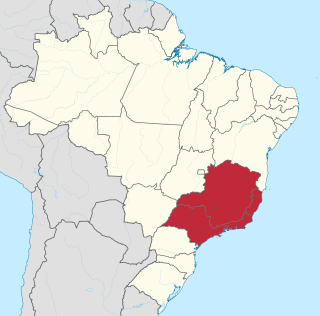
São Paulo is one of the 26 states of the Federative Republic of Brazil and is named after Saint Paul of Tarsus. A major industrial complex, the state has 21.9% of the Brazilian population and is responsible for 33.9% of Brazil's GDP. São Paulo also has the second-highest Human Development Index (HDI) and GDP per capita, the fourth-lowest infant mortality rate, the third-highest life expectancy, and the third-lowest rate of illiteracy among the federative units of Brazil. São Paulo alone is wealthier than Argentina, Uruguay, Paraguay, and Bolivia combined. São Paulo is also the world's twenty-eighth-most populous sub-national entity and the most populous sub-national entity in the Americas.

Sneakers are shoes primarily designed for sports or other forms of physical exercise, but which are now also widely used for everyday casual wear.

The Southeast Region of Brazil is composed of the states of Espírito Santo, Minas Gerais, Rio de Janeiro and São Paulo. It is the richest region of the country, responsible for approximately 60% of the Brazilian GDP, as São Paulo, Rio de Janeiro, and Minas Gerais are the three richest states of Brazil, the top three Brazilian states in terms of GDP. The Southeast of Brazil also has the highest GDP per capita among all Brazilian regions.

New Balance Athletics, Inc. (NB), best known as simply New Balance, is one of the world's major sports footwear and apparel manufacturers. Based in Boston, Massachusetts, the multinational corporation was founded in 1906 as the New Balance Arch Support Company.

Jelly shoes or jellies are a type of shoe made of PVC plastic. Jelly shoes come in a large variety of brands and colors and the material is sometimes infused with glitter. Its name comes from the French company called Jelly Shoes, founded by Tony Alano and Nicolas Guillon in 1980 in Paris.

The L. S. Starrett Company is an American manufacturer of tools and instruments used by machinists, tool and die makers, and the construction industry. The company was founded by businessman and inventor Laroy Sunderland Starrett in 1880. The company patented such items as the sliding combination square, bench vises, and a shoe hook fastener. It makes precision steel rules and tapes, calipers, micrometers, and dial indicators, among others.

Cianorte is a city in northwest Paraná, Brazil, with an estimated population of 83,816, according to the Brazilian Institute of Geography and Statistics in 2020.

Ford Brasil is the Brazilian subsidiary of American automaker Ford Motor Company, founded on April 24, 1919. The operation started out importing the Ford Model T cars and the Ford Model TT trucks in kit form from the United States for assembly in Brazil. The Ford brand, however, had already been present in the country since 1904 with both vehicles being sold in Brazil.

Brazilian industry has its earliest origin in workshops dating from the beginning of the 19th century. Most of the country's industrial establishments appeared in the Brazilian southeast, and, according to the Commerce, Agriculture, Factories and Navigation Joint, 77 establishments registered between 1808 and 1840 were classified as "factories" or "manufacturers". However, most, about 56 establishments, would be considered workshops by today's standards, directed toward the production of soap and tallow candles, snuff, spinning and weaving, foods, melting of iron and metals, wool and silk, amongst others. They used both slaves and free laborers.

Havaianas is a Brazilian brand of flip-flop sandals created and patented in 1962. It is currently owned by Brazilian manufacturing company Alpargatas S.A.. Inspired by Japanese zori sandals, Robert Fraser became the first to mass-produce flip-flops out of rubber. The name Havaianas is derived from the feminine form of the Portuguese word for "Hawaiians", and the pattern on the soles of the sandals is designed to resemble the straw soles of zori. Originally, all Havaianas featured white insoles with colored outsoles and straps. Because of their simplicity and low price, the sandals became rapidly popular with Brazil's lowest social classes. However, now their popularity is generalized and the brand controls 80% of the Brazilian rubber slippers market: in fact, of every three Brazilians, two on average consume a pair of "Havaianas" per year.

The economy of the Empire of Brazil was centered on export of raw materials when the country became independent in 1822. The domestic market was small, due to lack of credit and the almost complete self-sustainability of the cities, villages and farms that dedicated themselves to food production and cattle herding. During the first half of the 19th century, the Imperial Government invested heavily in the improvement of roads while retaining an excellent system of ports. The former facilitated better commercial exchange and communication between the country's distant regions; the latter did the same for foreign trade.
The Brazilian automotive industry is coordinated by the Associação Nacional dos Fabricantes de Veículos Automotores (Anfavea), created in 1956, which includes automakers with factories in Brazil. Anfavea is part of the Organisation Internationale des Constructeurs d'Automobiles (OICA), based in Paris. In 2013, the annual production exceeded 3,7 million vehicles, the seventh largest in the world, although they have fallen substantially more recently.

Alpargatas Argentina is the leading textile manufacturer in Argentina, as well as a major local distributor and exporter. Originally established in Argentina in 1883, since 2008 the company is a subsidiary of Brazilian Alpargatas S.A., formerly part of the industrial conglomerate Camargo Corrêa.
Ipanema is an Old Tupi term meaning "bad water", i.e. a body of water that is unsuitable to a certain task. It can refer to:
Vulcabrasǀazaleia is a Brazilian footwear company, being the third largest in domestic market and in Latin America, only after also Brazilians Alpargatas and Grendene. The company was founded in 1952 in São Paulo, but currently is headquartered in Jundiaí.

Lorenzo Merlino is a Brazilian fashion designer.
Alexandre Grendene Bartelle is a Brazilian businessman and billionaire. In 1971, co-founded sandal manufacturer Grendene with his brother, Pedro Grendene Bartelle. According to Forbes, he was worth US$1.86 billion as of May 2016.
Iron Studios is a Brazilian company based in São Paulo specializing in the manufacture of collectible statues. The company works with property licenses from Disney, Marvel Comics, DC Comics, and Star Wars. It produces models in 1/10th scale and larger models in 1/6th and 1/4th scale. The statues are made from Polystone, a high-density resin that offers resistance to heat and humidity. Real fabric or die-casting is used to produce other details.

CNN Brazil is a Brazilian news-based pay television channel. Launched on 15 March 2020, CNN Brazil is owned by Novus Media, a joint-venture between Douglas Tavolaro, former header of RecordTV's news division, and Rubens Menin, owner of MRV Engenharia. Novus Media has a licensing agreement with original CNN channel owned by Warner Bros. Discovery.
Muti Randolph is a Brazilian architect, designer and artist.













